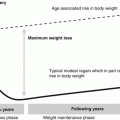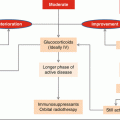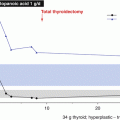Features due to glucocorticoid insufficiency
Weakness
Malaise
Weight loss
Nausea and vomiting
Hypoglycaemia
Myalgia
Anaemia
Features due to mineralocorticoid insufficiency
Hypotension
Dehydration
Hyponatraemia
Features due to reduced adrenal androgens
Decreased body hair
Decrease libido, especially in females
Dry itchy skin
Features due to increased ACTH (adrenocorticotrophic hormone) secretion
Increased pigmentation over sun exposed areas, knuckles, palmar creases
Increased pigmentation of mucous membranes such as oral mucosa.
Table 12.2
Causes of adrenal sufficiency
Autoimmune destruction of the adrenal glands |
Polyglandular deficiency type I |
Polyglandular deficiency type II |
Sporadic autoimmune destruction of the adrenals |
Infective adrenalitis |
Tuberculosis |
HIV |
Intra-adrenal haemorrhage |
Metastatic cancer to the adrenals |
Infiltrative disease |
Haemochromatosis |
Amyloidosis |
Sarcoidosis |
What other tests would you consider in this patient?
In view of the presence of generalised malaise, weight loss, postural hypotension with hyperpigmentation, adrenal insufficiency should be on part of the differential diagnosis. A short corticotropin test should be carried out to confirm this; 250 micrograms (µg) of ACTH should be given to this patient with base line and 30 min cortisol levels measured. A baseline serum ACTH levels should also be measured at the start of the corticotropin test, this will help exclude secondary adrenal insufficiency. There is considerable variability between cortisol results of different assays, thus cortisol results should be interpreted using locally derived cut-off values.
Antibodies to 21-hydroxylase enzyme may be present in patients with Addison’s disease.
Plasma renin activity and aldosterone should be measured. In patients with Addison’s disease, plasma renin activity will be high while the plasma aldosterone will be low.
Imaging of the adrenal glands using CT scan or MRI scan may be helpful in determining the cause of adrenal insufficiency. This may identify any infiltration, calcification and haemorrhage.
The low baseline cortisol, suboptimal 30-min cortisol value, high ACTH, high urine sodium and hyponatraemia confirm the diagnosis as Addison’s disease.
Biochemical results for the patient are presented in Table 12.3.
Table 12.3
Biochemical results for the patient
Serum/plasma | Spot urine | |
|---|---|---|
Sodium (mmol/L) | 128 | 46 |
Potassium (mmol/L) | 4.8 | 11 |
Urea (mmol/L) | 7.2 | |
Creatinine (μmol/L) | 126 | |
TSH (miu/L) | 1.1 | |
T4 (pmol/L) | 17.6 | |
Osmolality (mOsmol/kg) | 278 | 390 |
Glucose (mmol/L) | 4.3 | |
Adjusted Calcium (mmol/L) | 2.55 | |
9 am Cortisol (nmol/L) | 136 | |
FSH iu/L | 13.1 | |
LH iu/L | 9 | |
Haemoglobin (g/L) | 100 | |
MCV (fl) | 84 | |
Platelet count (× 1012) | 327 | |
RBC count (× 109) | 6.8 |
How would you treat this patient?
Acute adrenal insufficiency is a life threatening condition and patients should be treatment immediately without any delays in getting a definitive diagnosis. Intravenous hydrocortisone 100 mg every 6 h should be given. Blood samples for electrolytes, cortisol and ACTH should be taken before administering hydrocortisone. Intramuscular hydrocortisone may be used if intravenous access is not available. Shocked patients will need fluid and electrolyte replacement while those with hypoglycaemia will also need dextrose. Stable patients may be given oral hydrocortisone.
Patients with primary adrenal failure will also require mineralocorticoid replacement given as fludrocortisone 0.05–0.1 mg/day. Patients with adrenal insufficiency should be aware that their corticosteroid and mineralocorticoid replacement will continue for life.
Adrenal crises occur due to glucocorticoid dose reduction or lack of dose adjustment in times of stress. In order to avoid an adrenal crisis, patients with adrenal failure should be advised to increase their steroid requirements during stress, intercurrent illness and pregnancy.
Background
The adrenal glands are important endocrine organs that produce glucorcorticoids, mineralocorticoids and androgens. The adrenal gland is composed of an outer cortex and an inner medulla. The outer cortex is divided in three parts: the outer zona glomerulosa, the mid zona fasciculata and an inner zona reticularis [1]. Mineralocorticoids which are produced by the outer zona glomerulosa are predominantly involved in sodium and potassium balance. Glucorcorticoids, which are produced by the fasciculate, are predominantly involved in carbohydrate metabolism but also have some effect in salt and electrolyte balance. The zona reticularis produces adrenal androgens which are metabolised peripherally to testosterone and dihydrotestosterone [2]. The adrenal gland is under hypothalamic-pituitary control to produce glucorcorticoids and the renin angiotensin system to produce mineralocorticoids.
Addison’s disease is a disorder of the adrenal glands that causes decreased production of adrenal hormones. This was named after Thomas Addison who was the first physician to make a connection between adrenal disease and the clinical signs and symptoms of adrenal failure. This may be as a result of a destructive process such as autoimmune disease, infiltrative disease such as tuberculosis, haemochromatosis, sarcoidosis or amyloidosis [3, 4]. Adrenal insufficiency occurs when more than 90 % of the adrenal cortex is destroyed resulting in minimal adrenal hormone production. Patients with pituitary or hypothalamic disease with decreased ACTH production develop secondary adrenal insufficiency.
Addison’s disease has a prevalence of about 140 per million in developed countries with a female preponderance [5]. Autoimmune disease is the most common cause of Addison’s in the developed world while tuberculosis the most common cause in developing countries. Other causes of Addison’s disease include drugs such as ketoconazole and metyrapone, adrenal infarction secondary to haemorrhage and conditions that interfere with adrenal hormone synthesis [6].
Stay updated, free articles. Join our Telegram channel

Full access? Get Clinical Tree







